Depending on where you work, it’s often a common practice to get a little something at the end of the year, perhaps a “thirteenth salary” or a bonus based on the company’s performance throughout the year. However, this doesn’t mean that all organizations are fair at all, and sometimes the rewards will pool at the top while the workers end up getting scraps. A netizen shared their surprise and shock when her husband got a 15% store discount at his company while his supervisors got $11k. We got in touch with the person who made the post and they shared some more details. It’s often nice to get something at the end of the year Image credits: Ave Calvar/Unsplash (not the actual photo) But one worker found out just how much his supervisors got for essentially doing nothing Image credits: Curated Lifestyle/Unsplash (not the actual photo) The person who made the post shared some more details Image credits: Impossible_Sugar_644 Many companies don’t value workers the way they should Bored Panda got in touch with the netizen who made the post and they were kind enough to share some more details. First of all, we wanted to hear if there was any follow-up. “Sadly there has been no update. The bonus that was given to my husband expired on the 3rd. Since it was only allowed to be used in store and was a one time discount, neither of us believe that should be even considered a “Christmas bonus”, especially since is a multi-billion dollar company.” “I think the post was so engaging because this is another clear example in this day and age that big corporations truly do not care nor do they truly value their workers. It is the evidence of the broken system. I think it was also so engaging because SO many people had similar experiences within their own companies. This post shined a light on how many companies will treat their front line workers as if we are worthless, when in reality those workers are the backbone upon which the company relies on.” “Many comments were people sharing similar stories from their own companies. These were helpful due to the fact they proved this was a systemic problem and not just a single company problem. The other comments I found helpful were from the people who gave information on how to start or form a union. I think this is a fabulous idea though Walmart is known for being very anti-union. The comments I found the least useful were those that just stated my husband should become a supervisor. Changing his position for a bigger bonus does not solve the bigger issue of how disrespected and undervalued the workers are, and how their bonus was more like a slap to the face than a reward for their hard work.” They left us with some parting thoughts. “I only want to add that companies have forgotten that they rely on the front line workers, and in this day and age the workers are no longer going to accept being treated as if they are slaves only there to make sure the company makes money.” Holiday bonuses are a tricky question Image credits: Getty Images/Unsplash (not the actual photo) Talking about bonuses is always tricky because, depending on where you live, they can be wildly inconsistent. Some countries literally mandate some sort of end of year benefit, while others make employees just hope that something might come through. It’s the sort of thing that falls into that strange middle ground, where it’s expected, but not necessarily required, so it can be awkward to ask, or even complain when it’s something laughably small. Yet companies will regularly make moves to pinch every penny without shame. However, the example in this story is so shockingly unfair that it seems hard to not complain. After all, a tiny discount at a store you don’t even shop at is the sort of thoughtless gift you get from a relative you don’t like, not a loyal employee. This is even more true when the company in question (the person who made the post specifies what company it is in the comments) reported profits that year. To add insult to injury, he worked multiple 10 hour shifts, only to not be properly rewarded at all. On the other hand, it’s likely that supervisors do more than just “sit around” but the issue isn’t as much their workload as it is the fact that they got a sizable bonus while the workers got practically nothing. After all, a discount can’t be used on rent or other expenses, except for, perhaps, some groceries. Even the most frugal person might struggle to actually find a proper use for a benefit like this. But some companies prefer to just undervalue their workers and pocket the money Image credits: Felix Koutchinski/Unsplash (not the actual photo) It’s worth considering how other countries do it. In much of Western Europe, as well as Latin America, there is something called the thirteenth salary, which is just that, a bonus equal roughly to one’s monthly wage, given at the end of the year, generally, for Christmas. There are, often, still come restrictions, for example freelancers are not entitled to it and you often have to work somewhere for over a year first. Interestingly, in many cases, the thirteenth (or fourteenth, in Brazil) salary is not taxed either. Still, it’s a marked improvement over a tiny, temporary discount. After all, who wants to rush to the supermarket after Christmas? Indeed, this is the sort of “benefit” which would have been best right before the holidays, as people buy gifts and decorations. Indeed, while we can’t say for certain, this does seem like the sort of “bonus” one gives when you remember it last minute and are scrambling. Unfortunately, this isn’t too uncommon of some American companies, where one has to “fight” for every bit of money. This is a growing issue with income inequality, as management will often increase rewards for themselves while ignoring their workers. As the Guardian noted, by the 6th of January this year (2025), most of the wealthiest CEOs across the largest 100 companies will have made more than the average employee makes in a year. So this sort of behavior isn’t just allowed, it seems practically encouraged. Readers were shocked and wanted more info Others gave some suggestions The post “Get $11,000 To Do Nothing?”: Wife Shocked After Finding Out About Husband’s Holiday Bonus first appeared on Bored Panda.“Get $11,000 To Do Nothing?”: Wife Shocked After Finding Out About Husband’s Holiday Bonus
Depending on where you work, it’s often a common practice to get a little something at the end of the year, perhaps a “thirteenth salary” or a bonus based on the company’s performance throughout the year. However, this doesn’t mean that all organizations are fair at all, and sometimes the rewards will pool at the top while the workers end up getting scraps.
A netizen shared their surprise and shock when her husband got a 15% store discount at his company while his supervisors got $11k. We got in touch with the person who made the post and they shared some more details.
It’s often nice to get something at the end of the year

Image credits: Ave Calvar/Unsplash (not the actual photo)
But one worker found out just how much his supervisors got for essentially doing nothing
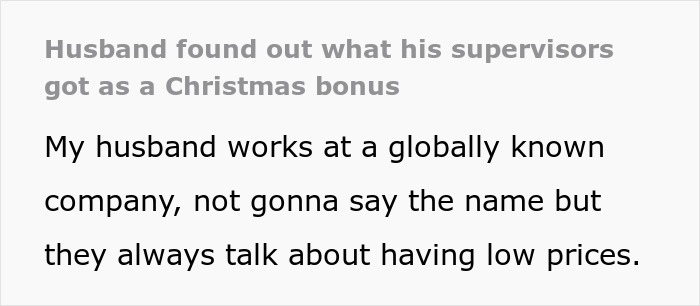
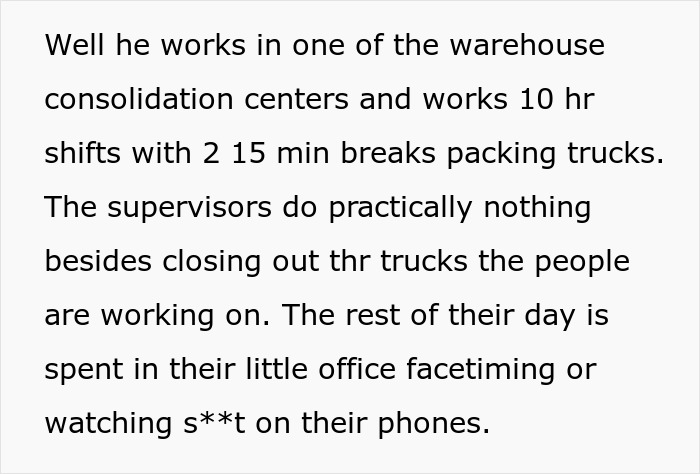

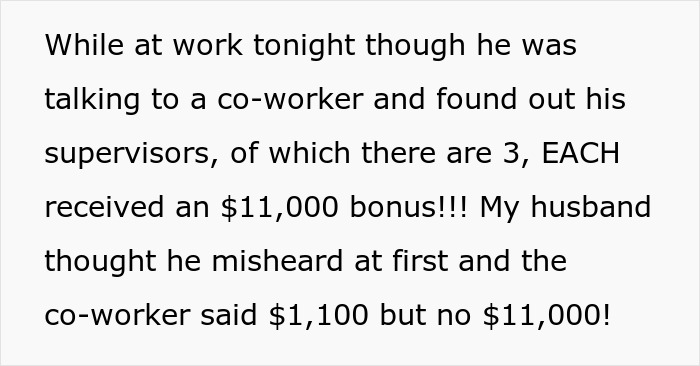


Image credits: Curated Lifestyle/Unsplash (not the actual photo)
The person who made the post shared some more details
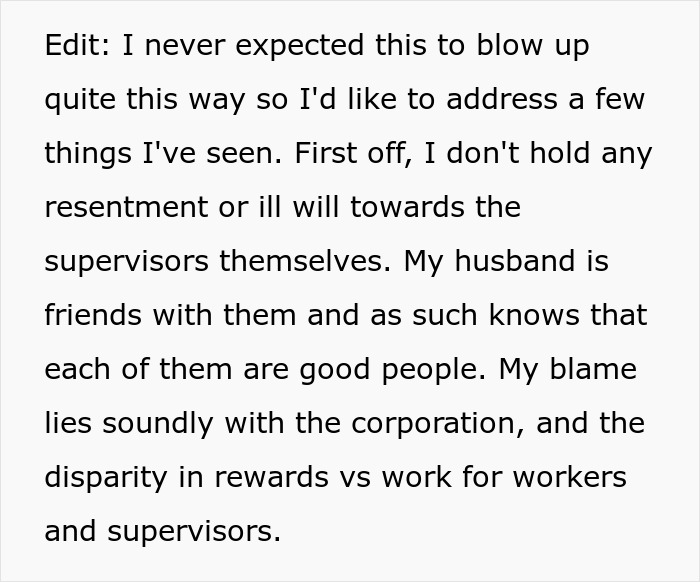
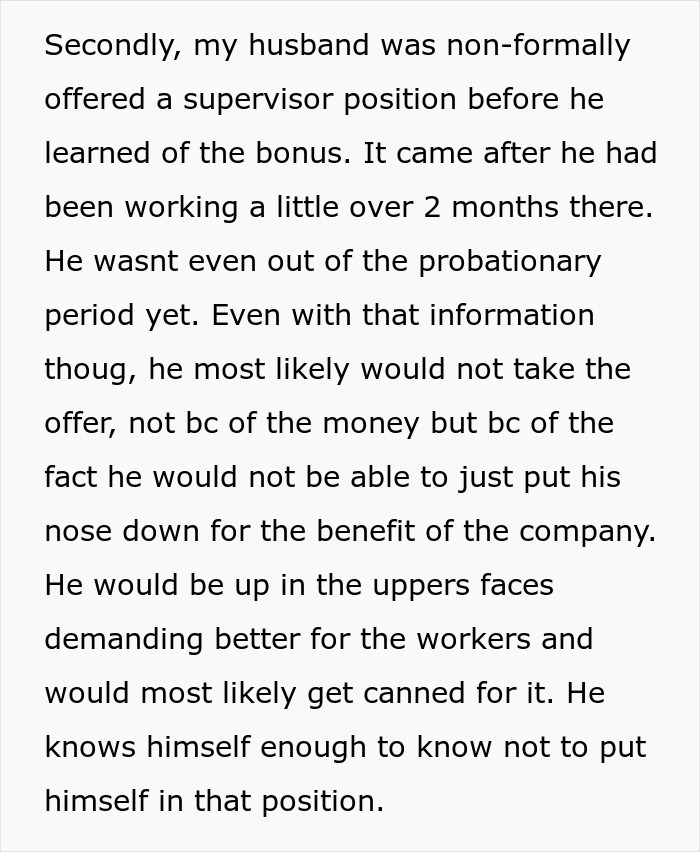
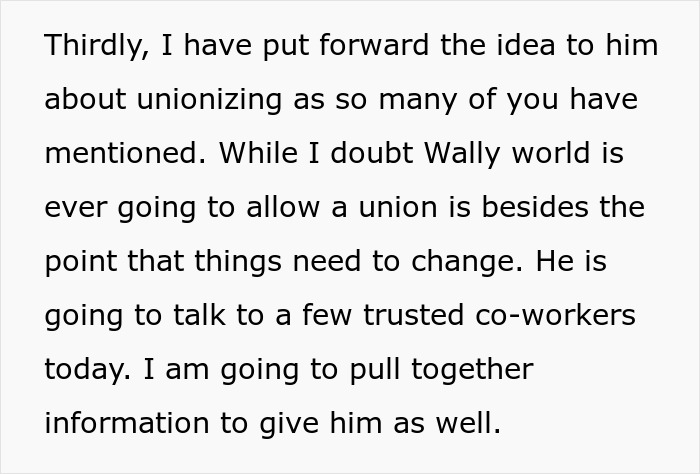
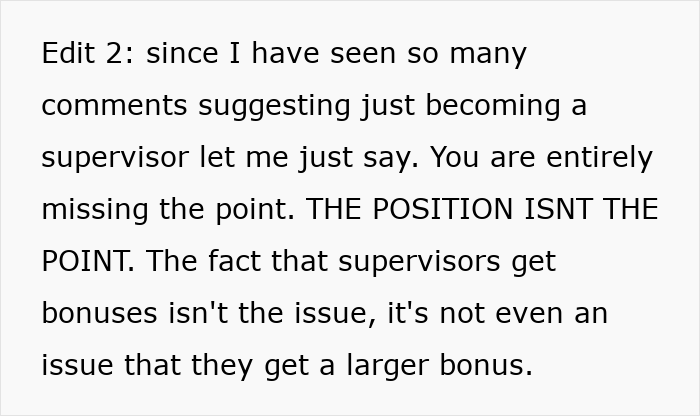
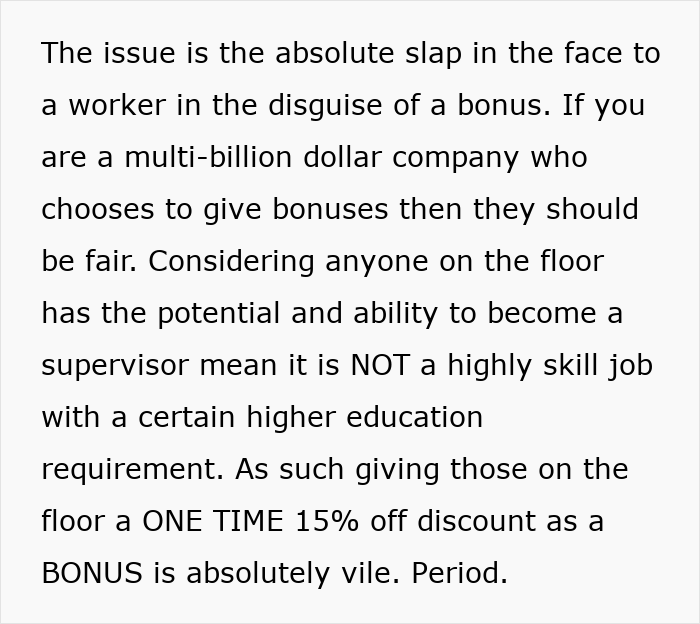
Image credits: Impossible_Sugar_644
Many companies don’t value workers the way they should
Bored Panda got in touch with the netizen who made the post and they were kind enough to share some more details. First of all, we wanted to hear if there was any follow-up. “Sadly there has been no update. The bonus that was given to my husband expired on the 3rd. Since it was only allowed to be used in store and was a one time discount, neither of us believe that should be even considered a “Christmas bonus”, especially since is a multi-billion dollar company.”
“I think the post was so engaging because this is another clear example in this day and age that big corporations truly do not care nor do they truly value their workers. It is the evidence of the broken system. I think it was also so engaging because SO many people had similar experiences within their own companies. This post shined a light on how many companies will treat their front line workers as if we are worthless, when in reality those workers are the backbone upon which the company relies on.”
“Many comments were people sharing similar stories from their own companies. These were helpful due to the fact they proved this was a systemic problem and not just a single company problem. The other comments I found helpful were from the people who gave information on how to start or form a union. I think this is a fabulous idea though Walmart is known for being very anti-union. The comments I found the least useful were those that just stated my husband should become a supervisor. Changing his position for a bigger bonus does not solve the bigger issue of how disrespected and undervalued the workers are, and how their bonus was more like a slap to the face than a reward for their hard work.”
They left us with some parting thoughts. “I only want to add that companies have forgotten that they rely on the front line workers, and in this day and age the workers are no longer going to accept being treated as if they are slaves only there to make sure the company makes money.”
Holiday bonuses are a tricky question

Image credits: Getty Images/Unsplash (not the actual photo)
Talking about bonuses is always tricky because, depending on where you live, they can be wildly inconsistent. Some countries literally mandate some sort of end of year benefit, while others make employees just hope that something might come through. It’s the sort of thing that falls into that strange middle ground, where it’s expected, but not necessarily required, so it can be awkward to ask, or even complain when it’s something laughably small. Yet companies will regularly make moves to pinch every penny without shame.
However, the example in this story is so shockingly unfair that it seems hard to not complain. After all, a tiny discount at a store you don’t even shop at is the sort of thoughtless gift you get from a relative you don’t like, not a loyal employee. This is even more true when the company in question (the person who made the post specifies what company it is in the comments) reported profits that year. To add insult to injury, he worked multiple 10 hour shifts, only to not be properly rewarded at all.
On the other hand, it’s likely that supervisors do more than just “sit around” but the issue isn’t as much their workload as it is the fact that they got a sizable bonus while the workers got practically nothing. After all, a discount can’t be used on rent or other expenses, except for, perhaps, some groceries. Even the most frugal person might struggle to actually find a proper use for a benefit like this.
But some companies prefer to just undervalue their workers and pocket the money

Image credits: Felix Koutchinski/Unsplash (not the actual photo)
It’s worth considering how other countries do it. In much of Western Europe, as well as Latin America, there is something called the thirteenth salary, which is just that, a bonus equal roughly to one’s monthly wage, given at the end of the year, generally, for Christmas. There are, often, still come restrictions, for example freelancers are not entitled to it and you often have to work somewhere for over a year first. Interestingly, in many cases, the thirteenth (or fourteenth, in Brazil) salary is not taxed either.
Still, it’s a marked improvement over a tiny, temporary discount. After all, who wants to rush to the supermarket after Christmas? Indeed, this is the sort of “benefit” which would have been best right before the holidays, as people buy gifts and decorations. Indeed, while we can’t say for certain, this does seem like the sort of “bonus” one gives when you remember it last minute and are scrambling.
Unfortunately, this isn’t too uncommon of some American companies, where one has to “fight” for every bit of money. This is a growing issue with income inequality, as management will often increase rewards for themselves while ignoring their workers. As the Guardian noted, by the 6th of January this year (2025), most of the wealthiest CEOs across the largest 100 companies will have made more than the average employee makes in a year. So this sort of behavior isn’t just allowed, it seems practically encouraged.
Readers were shocked and wanted more info
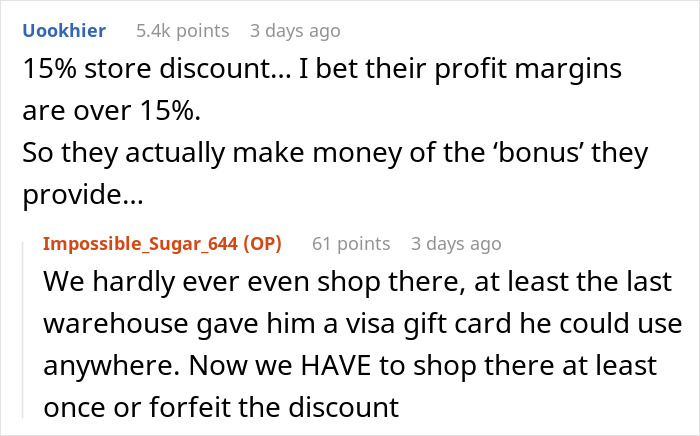
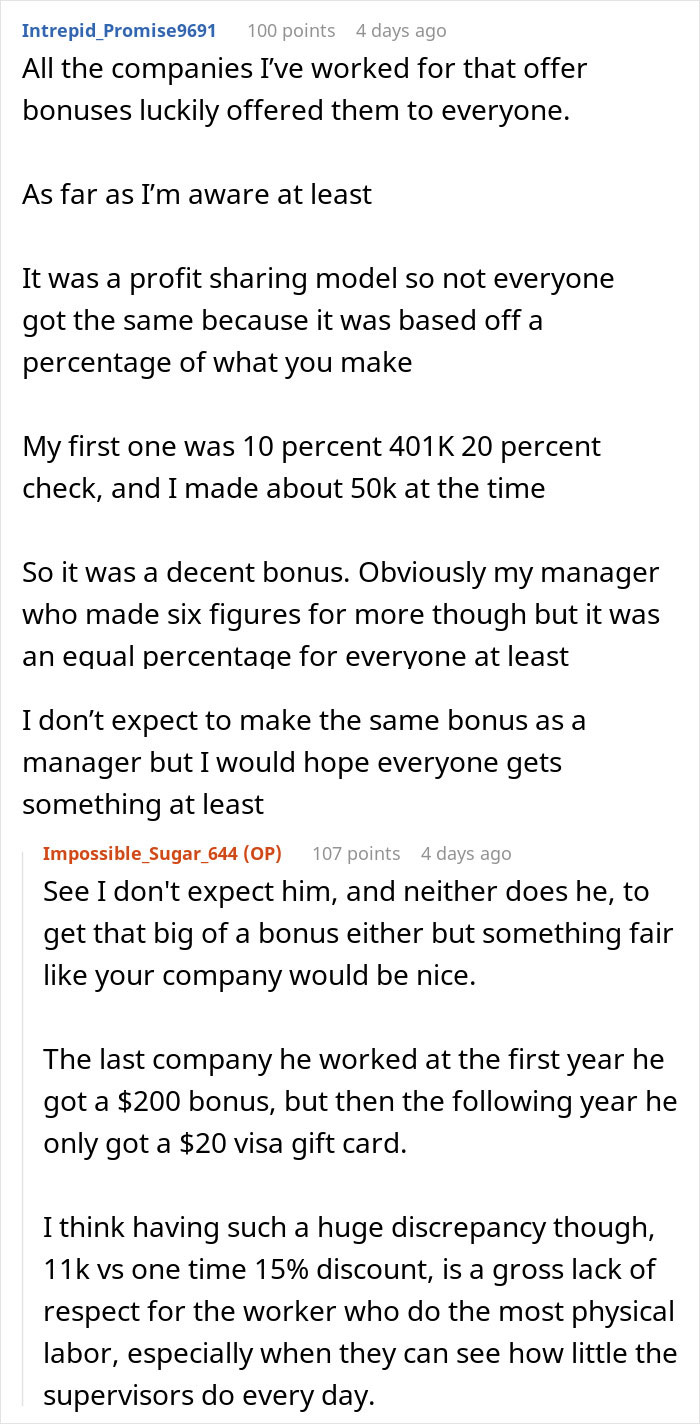
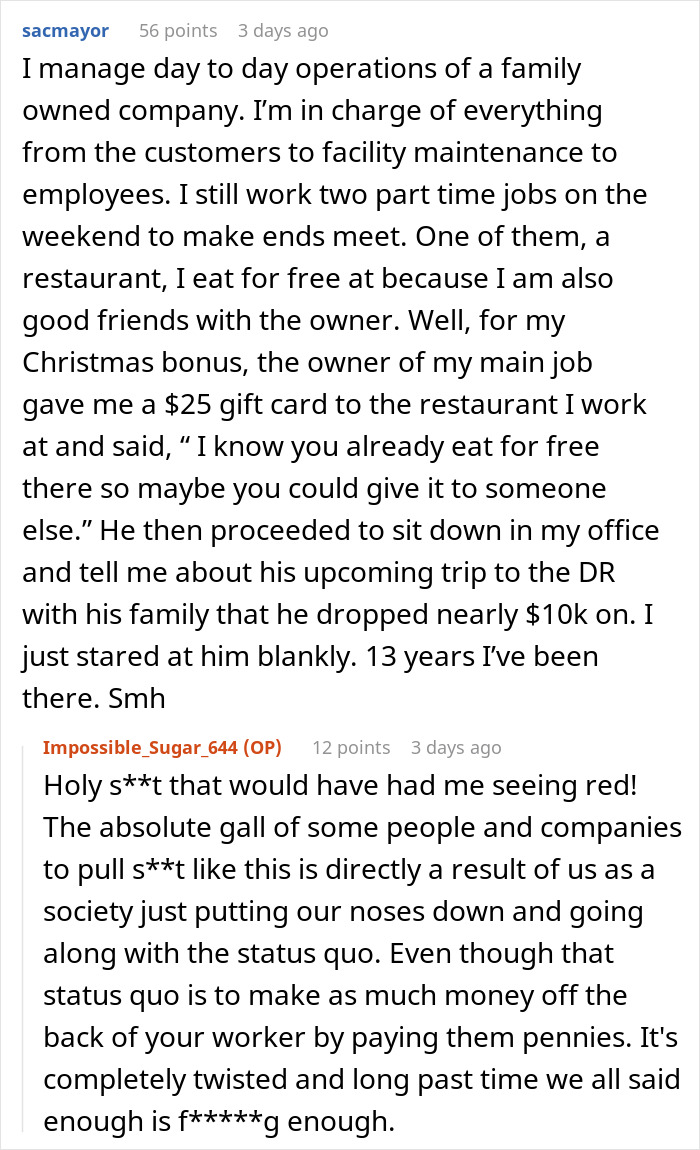


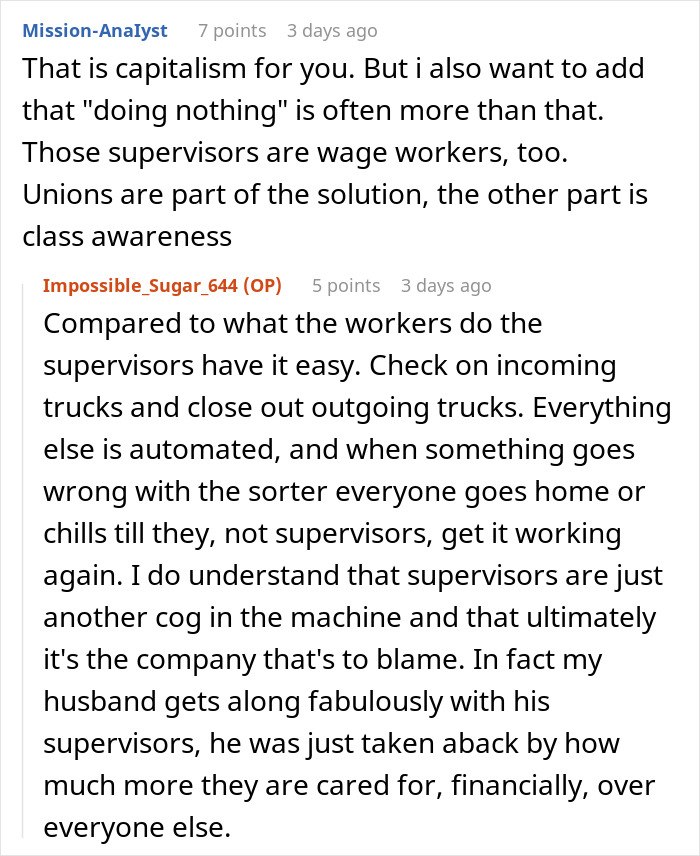

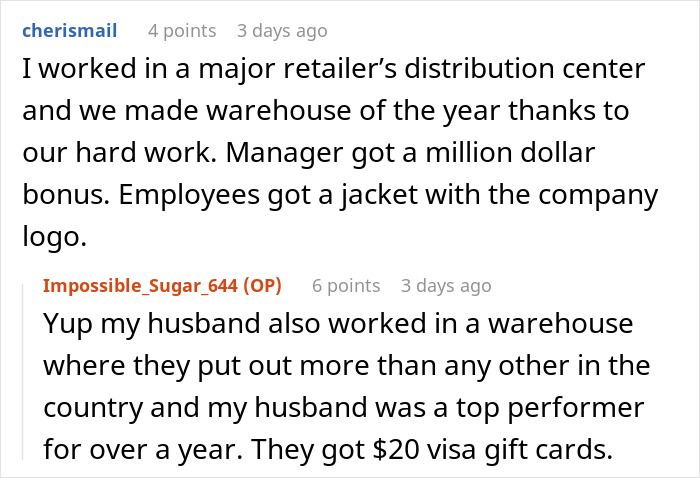

Others gave some suggestions
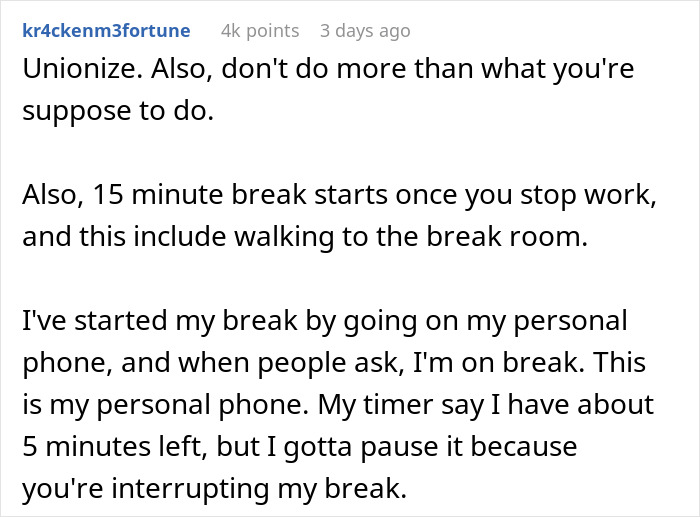






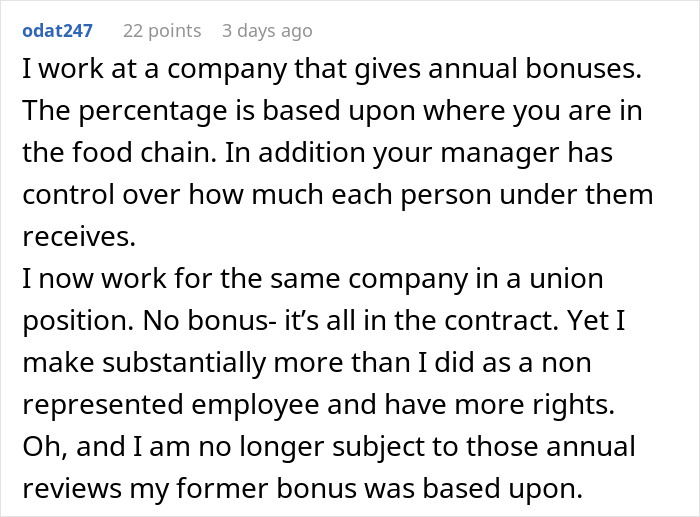


from Bored Panda https://ift.tt/hLXyAP0




No comments: